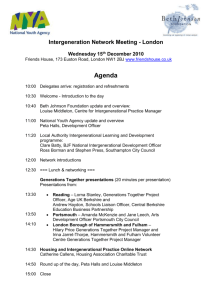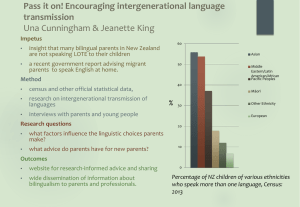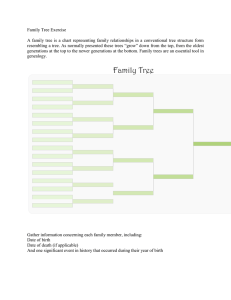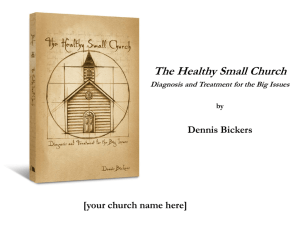Intergenerational Ministry - Planning Guide
advertisement
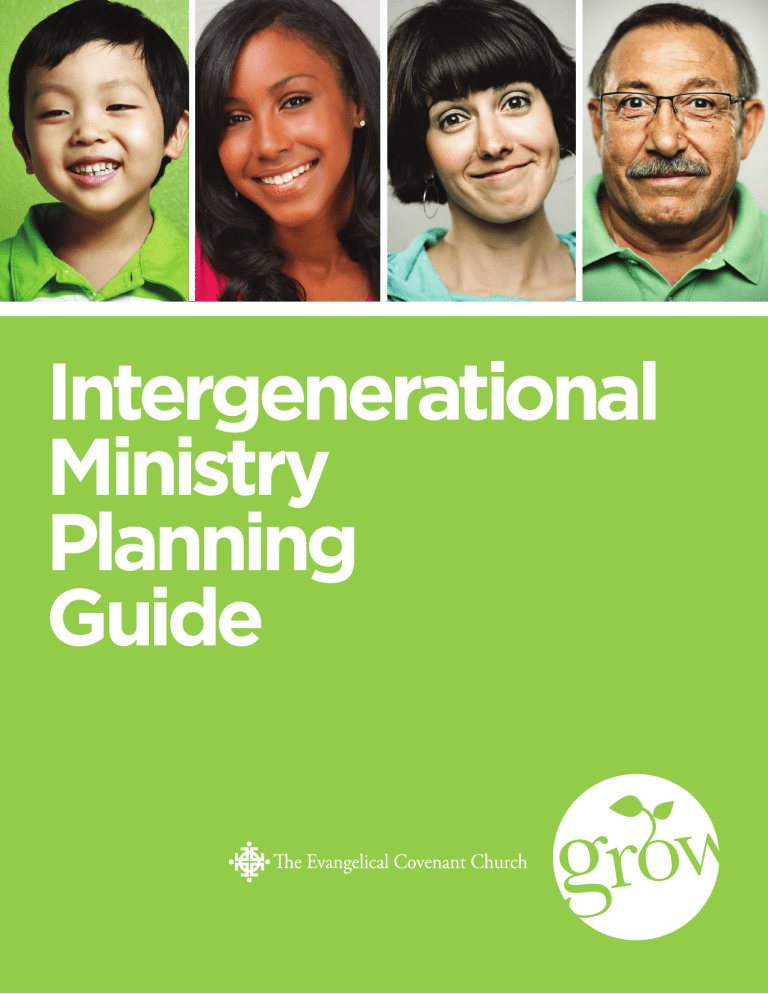
Intergenerational Ministry Planning Guide Intergenerationally Intergenerational Planning Guide This guide offers suggestions for facilitating a comprehensive approach to intergenerational discipleship, that complements peer-­‐based ministry and focuses on practical elements and practices that enable persons to follow the heart of God into the world. Four Steps: EVALUATE / PLAN/ INVITE / GROW is a helpful four-­‐step way to organize, plan and sustain intergenerational discipleship. Below you will find suggestions and resources for each step. This resource has been developed in a way that enable pastor, staff and leaders to deepen relationships with each other and God as they formationally move through each step of the journey. You may choose to approach each step in individual gatherings or a retreat setting. Live into each step prayerfully seeking the direction and will of God. 1 Evaluate 4 Grow 2 Plan 3 Invite 1 EVALUATE Where is our church at right now intergenerationally? Below you will find several assessment options. You may use however many you wish. Keep in mind that although the story options take longer to determine the pulse of the congregation, they also give voice to the congregation and a deeper understanding of how the Spirit is at work within individuals and families. 1. Assessing Church Culture: A deeper understanding of the culture in which we minister is helpful in evaluating readiness to engage as a body intergenerationally. The Initial Questions resource asks key questions to assist staff and leadership in understanding the core values, backgrounds and influences of the community. You can find it in the Assessment Section. 2. Assessing Current Ministry: (Presence, Engagement and Voice) This three fold assessment will help give you a good picture of what intergenerational ministry looks like right now in your church setting. You can find it in the Assessment Section 3. Congregational Voice: Besides the ministries of the church, these two congregational assessments provide a gimps into the intergenerational activity of the congregation apart from the formal ministries of the church. They also serve to give voice to the congregation, addressing not only where they are at but where they want to go. Personal Assessment: How am I GROWing Intergenerationally? (In the Assessment Section) Telling Your Story: Offers ways for the congregation to share intergenerational experiences. http://www.covchurch.org/resources/files/2010/05/Telling-­‐Your-­‐Story.pdf Prayer of Examen: Once you have gathered the information, the next portion of the evaluation step is to enter into a time of prayerful evaluation. You can use this spiritual practice to review what you have learned through the assessments. 1. Acknowledge being in the presence of GOD. We are always in God’s presence, but in prayer we place ourselves in God’s presence in an especially attentive way. God knows the whole body intimately and loves us in the deepest possible way. As we still ourselves we become more aware of God’s presence both around us and within us. 2. Look at the assessments with gratitude. After a few moments, begin to give thanks to God for what has been shared and observed and for the specific work of the Spirit within the body. 3. Ask help from the Holy Spirit Ask that God’s Spirit might help us look at our actions and attitudes and help us to understand the intentions and motivations of our hearts. Ask that the Spirit would shape our thinking and decisions. 4. Review the journey The assessments are really meant to help us see how we have been living into God’s story. This is not the stage where we are trying to “fix” anything but examining what has already transpired. Pray through each assessment and capture thoughts and ideas. Pray through the Initial Questions Assessment What are the highlights? What do we want to affirm? Where are the struggles? Where do we see God at work? Where do we see needs that might need addressing? Pray through the Presence, Engagement, Voice Assessment What are the highlights? Are there any surprises? What do we want to affirm? Where do we see needs that might need addressing? Pray through Personal Assessment: How am I GROWing Intergenerationally? What do we want to affirm? Are there any subtle or underlying issues or needs? What do we acknowledge are struggles? Where do we see needs that might need addressing? Pray through Story Where has God been at work? What are the highlights? What do we want to affirm? Where are the struggles? Where do we see needs that might need addressing? Prayer Review What have you noticed that is most spiritually fruitful for the church? What do we believe should continue in concept? In form? What do we believe needs addressing? PLAN 2 Preparing to Plan Remember this is not about developing a program but a plan for helping the community of faith draw closer to God and each other so that all might follow the heart of God into the world. Embodying Our Faith: This spiritual practice is helpful in establishing posture for moving forward. http://www.covchurch.org/resources/files/2010/05/Embodying-­‐Our-­‐Faith.pdf Developing a Plan Prayerfully developing the plan As you move forward with planning you might consider inviting additional persons to represent the broad spectrum of generations within the church. Once again this is an opportunity to provide presence, engagement and voice. Developing a Rule of Life: Use this spiritual practice to begin developing a rule of life for the congregation. You may find the “Resource Options” at the end of this Planning Guide helpful. 1. Draw a grid with three columns. Label the columns, Weekly, Monthly, Annually. 2. Ask help from the Holy Spirit Ask that God’s Spirit might help us look at our actions and attitudes and help us to understand the intentions and motivations of our hearts. Ask that the Spirit would shape our thinking and decisions. 3. Based on results of the prayer of Examen, prayerfully consider where and how will we journey together this year. (The “Resource Options” on the following pages might be helpful as you plan) a. What will we do? c. When will we do it? e. When will we begin? b. Where will we go? d. Why are we doing it? f. Post these on the grid 4. Prayerfully consider how will we do it. a. Who will be present? b. Where will we give opportunity for voice? c. How will we share story? d. What resources will be needed? e. Who is responsible? (The persons identified here will be responsible for 1, 2 & 3 below) 1. How will those present be engaged? 2. How will we give opportunity for voice? 3. How will we seek the voice of God together? 5. Prayerful Review (You may want to provide some space here before coming back to review) a. Ask for clarity and affirmation c. Thank God for where you have come b. Review and adjust 3 INVITE Approaches In essence what we are inviting the congregation to are shared intergenerational experiences. These shared experiences lead in turn to a shared story and a shared identity. The plan details out the experiences that hopefully include space for sharing and celebrating story. There are often three general target groups to invite. 1. The entire church body 2. Parents/Guardians/Grandparents 3. Children and Youth The entire church may be invited to participate in ministry opportunities both inside and outside the church. However, because some ministries have included only adults and could now include children and youth, a special invitation or personal invitation may need to be made so they know that the ministry is open to them as well. Some intergenerational ministries are focused on equipping parents to guide their children spiritually. Often this also requires the sensitivity of making sure we invite foster parents, guardians and grandparents who may be playing a significant role in the spiritual growth of children. Don’t be discouraged if everyone doesn’t to jump at the newly offered intergenerational options. If this is a new concept it will take time for people to decide how they will navigate and live into it. Personal invitation will eventually reveal early adopters which will help others to see what it is they could live into. Coordinating intergenerational options with a GROW discipleship emphasis can help people ease into intergenerational ministry. It also puts the emphasis in growth as disciples of Christ within the body of Christ while offering space for share story, reaching out into the community and building identity. 4 GROW Sustaining Growth We can begin with good intentions but sustaining intergenerational spiritual growth throughout the year takes intentionality in order for new practices to become a natural part of our lives individually and across the generations. 1. Pray for spiritual growth a. Pray as a staff b. Pray as church leadership c. Pray as families d. Pray as a congregation in worship and whenever there is a gathering 2. Keep the plan in front of the body a. Keep inviting the body to enter into GROW and supporting intergenerational ministries b. Keep reminding the body of God’s desire for us to GROW and the ways and ministries that are available to help us GROW c. Keep identifying elements of growth within the sermon sharing stories of growth from all generations 3. Live into the plan a. Encourage participation in a GROW Retreat, GROW groups, or GROW practices b. Help foster communion with God when approaching scripture c. Encourage an attentiveness to the Spirit in every relationship d. Encourage participation in serving the community e. Engage and give voice to the generations in worship while fostering attentiveness to the Spirit. f. Affirm the progress that is being made 4. Celebrate the unfolding story a. Gather church staff and leaders for quarterly reflections on their spiritual Journey intergenerationally. b. Encourage leaders to give short testimonies of their GROW journey and their intergenerational journey at church leadership, and committee meetings. c. Encourage families, couples and individuals to daily share the story of their walk with Christ d. Videotape members of all ages sharing the joys and struggles of living into their Invitation to GROW. These can be used during a worship service, retreat or posted on your website to be viewed by others. e. Ask one person or family to share their story of living into God’s invitation to GROW each month during worship. f. Plan for an annual GROW celebration service. Celebrate the spiritual growth that has transpired over the past year and respond to a new invitation for the upcoming year. Assessments Intergenerationally Initial Questions: 1. Do the majority of people at church understand why the church is including intergenerational ministry along with peer based ministry? Is there any push back? If so from whom? Why? 2. Can most people articulate the churches values and would they include intergenerational community as one of them? 3. What percentage of people know how to live into intergenerational ministry or formation? 4. What percentage are looking for help in how to live this out? 5. What percentage are not looking for this? 6. How is intergenerational community currently being lived out? 7. Who are the greatest proponents? 8. Does the culture of the surrounding community include engagement in intergenerational activity? 9. How do we define intergenerational ministry? 10. Have we identified: 1. The biblical rationale 2. Benefits 3. Key elements 4. Steps for moving forward 11. Do we have a common language for moving forward? 12. How do we facilitate open discussion and answer questions? Intergenerational Church Assessment How is the Church Living into Three Intergenerational Pillars? • Presence • Engagement • Voice Assessing and Reflecting Review all church ministries and gatherings (Note that not every ministry is appropriate for all generations. Look for balance and possibilities) What generations are present in our gatherings and ministries? What generations are missing? What generations could be present? AS A CHURCH, HOW ARE WE… Giving voice to each generation? Engaging each generation? AS A CHURCH, HOW COULD WE… Give voice to each generation? Engage each generation? Engagement Are we intentional in our efforts to engage everyone? Do we foster an environment where everyone knows they are valued? Do we provide opportunities for everyone to question and explore their faith? Do we encourage the generations to minister together in fulfilling the will of God? Three Key Elements that Bring Generations Together • Shared Experience • Shared Story • Shared Identity What experiences are currently being shared among the generations? Where and how is story being shared? What is the current identity of the church among the generations? How am I GROWing Intergenerationally? There are no right or wrong answers to these survey questions. This is simply a tool to see how we are already interacting intergenerationally and to get a pulse on where we would like to grow intergenerationally. Age: ________ Sex: M F How many generations live in our home?____________ Gods Word Circle all generations whom you currently interact with while reading, exploring or reflecting on the Bible. Underline all generations you would be open to interacting with while reading, exploring or reflecting on the bible. Children Youth Young Adult Adult Later Adult None Relationships Circle all generations whom you currently engage in faith life conversations or have a spiritually growing relationship. Underline all generations you would be open to engage in faith life conversations or have a spiritually growing relationship. Children Youth Young Adult Adult Later Adult None Circle all generations whom you currently serve with in ministry inside the church. Underline all generations you would be open to serving with in ministry inside the church. Children Youth Young Adult Adult Later Adult None Outward Action Circle all generations whom you currently serve with in ministry outside the church. Underline all generations you would be open to serving with in ministry outside the church. Children Youth Young Adult Adult Later Adult None Worship Circle all generations whom you currently worship and pray with outside the church. Underline all generations you would be open to worshipping and praying with outside and inside the church. Children Youth Young Adult Adult Later Adult None Why I want to GROW intergenerationally:________________________________________________________________ ____________________________________________________________________________________ Intergenerationally Outward Action Event Assessment What is the event? How will it be announced to all ages? How do people sign up? Who is involved in planning the event? In what ways can people serve during this event/project? What parts of the event/project are accessible to... Children (12 and under)? Teens (13-18)? Early Adults (18-30) Middle Adults (31-59) Later Adults (60- )? Will families be able to serve together? Will different generations intentionally interact during the project/event? Where will this happen? How will this happen? How will it benefit the body? The community? How is the story told afterwards? Who gets to tell it? Worship Evaluation Evaluate each statement and include percentage of weekly occurrence where appropriate. For example if a statement is true for half the weekly services, the percentage would be 50% or 26 weeks. 1. Church leaders encourage and advocate for worship that is intergenerational and worship leadership that includes all generations. 2. All generations are considered in the planning of each worship service Attention is paid to inclusive vocabulary that children as well as adults can understand Sermon illustrations include references to all generations including children and youth The inclusion of each generation is considered within prayer elements The service and setting include images and the opportunity for each participant to experience them. Movement is planned into each worship service and sensitive to everyone. Experiential elements are included Attention is given to the amount of time allotted for each worship element and the attention span of children. Parents are equipped to help children worship The congregation is educated on how to encourage and affirm children in worship Consideration is given to helping prepare children and youth to serve as worship leaders All generations are given the opportunity to share their continuing stories of faith. Worship Leaders reflect the entire body including children and youth… as prayer leaders as scripture readers as ushers and greeters through sharing their stories of faith through music through drama or dance within a creative worship planning team through AV, worship set up and clean up 3. 4. 5. 6. 7. 8. 9. 10. 11. 12. 13. 14. 15. 16. 17. 18. 19. 20. 21. Yes No % or # of Weekly Occurrences Intergenerationally Growth Assessment How will we know people are growing? Indicators of a Growing Disciple of Christ 1. Transforming Relationship with God 2. Connecting with God’s Word and God’s people 3. Participating in God’s Mission Transforming Relationship with God • • • • Attentive and responsive to God’s will and way Accepting the grace and forgiveness of Jesus Listening and following the guidance of the Holy Spirit Participating in communal worship and the sacraments Connecting with God’s Word and God’s people • • • • • Ongoing and consistent learning/growth through the study and meditation of the bible Godly living in right relationships with all others Active involvement in Christian community Engaging in spiritual discipline Discovering God’s ongoing story -- personally, communally and globally. Participating in God’s Mission • • • • • • • Loving others in word and works locally and globally Ministering together with all generations Embracing evangelism, compassion, mercy & justice Celebrating where the kingdom has come and mourning where it is yet to come Developing and deploying spiritual gifts Stewardship of God given resources Discipling others along the journey Resources Options For Planning and Implementation Planning Resources Developing and Sustaining Small Groups Teaching and Learning Mentoring and Coaching http://www.covchurch.org/adults/intentional-­‐discipleship Group, Mentoring and Individual Resources GROW / CRECER (English and Spanish) http://covbooks.com/products/grow-­‐bible-­‐study-­‐english http://covbooks.com/products/crecer Real Life Field Guide Adults and Youth http://www.covchurch.org/resources/?s=Real+Life+Field+Guide Journey for Youth and Adults http://covbooks.com/products/journey-­‐new-­‐testament http://covbooks.com/products/journey-­‐old-­‐testament http://covbooks.com/products/journey-­‐leaders-­‐guide http://covbooks.com/products/journey-­‐for-­‐adults Rock Solid: Exploring Faith Foundations for Youth and Adults https://www.covchurch.org/resources/rock-­‐solid/ Exploring God’s Word https://www.covchurch.org/resources/exploring-­‐gods-­‐word/ New Life in Christ (English and Spanish) https://www.covchurch.org/resources/new-­‐life-­‐in-­‐christ/ GROWing Deeper Spiritual Practices http://www.covchurch.org/resources/growing-­‐deeper-­‐practices/ Parenting Resources Journey Parent Mentor Guide http://covbooks.com/products/the-­‐journey-­‐parent-­‐mentor-­‐guide-­‐and-­‐audiobook MY GROW Adventure with God Parent/Mentor Guide https://www.covchurch.org/resources/my-­‐grow-­‐adventure/ Parents as Spiritual Mentors Praying with Children Bible Reading Plans http://www.covchurch.org/children/parents/ Outward Action Resources Advocacy for Victims of Abuse (AVA) http://www.covchurch.org/abuse/ Invitation to Racial Righteousness https://www.covchurch.org/resources/invitation-­‐to-­‐racial-­‐righteousness/ Kids Helping Kids https://www.covchurch.org/relief/projects/special/childrens-­‐service-­‐project/ Kids Congo http://www.covchurch.org/covenantkidscongo/ Human Trafficking Project Booklet http://www.covchurch.org/trafficking/protect-­‐booklet/ Sankofa Journey: 72 Hour interactive cross-­‐racial prayer journey http://www.covchurch.org/resources/sankofa-­‐journey/ Sharing Story Resources Your Story (English and Spanish) http://www.covchurch.org/resources/your-­‐story/ Telling Your Story http://www.covchurch.org/resources/files/2010/05/Telling-­‐Your-­‐Story-­‐for-­‐web.pdf Worship Resources Week of Prayer (English, Spanish and Korean) http://www.covchurch.org/resources/truly-­‐praying/ Breathe: Personal Approaches to Deepening Journey with God http://www.covchurch.org/resources/?s=breathe Prayer retreats: http://www.covchurch.org/discipleship/prayer/retreats/ Moment-­‐to-­‐Moment: An Invitation to Prayer Streams and Pathways: An Exploration of Spiritual Practices Journeying Together: An Introduction to Spiritual Companionship Teacher Resources for Children Children’s Ministry Planning Tool http://www.covchurch.org/resources/childrens-­‐planning-­‐tool/ My GROW Adventure with God Teachers Guide http://www.covchurch.org/resources/my-­‐grow-­‐adventure/ Adventures with God Children’s curriculum includes GROW exploration http://www.covchurch.org/resources/adventures-­‐with-­‐god/ Intergenerational Ministry Resources Incorporating Children in Worship Michelle A. Clifton-­‐Soderstrom and David D. Bjorlin Cascade Books, 2014 ISBN 13: 978-­‐1-­‐62032-­‐621-­‐3 Intergenerational Christian Formation Holly Catterton Allen and Christine Lawton Ross InterVarsity Press, 2012 ISBN 978-­‐0-­‐8308-­‐3981-­‐0 Generations Together Kathie Amidei, Jim Merhaut and John Roberto Lifelong Faith Publications, 2014 ISBN 978-­‐0-­‐9823031-­‐5-­‐3 Sticky Faith Kara Powel and Chap Clark Zondervan, 2011 ISBN 978-­‐0-­‐310-­‐32932-­‐9 The Church of All Ages Generations Worshipping Together Howard Vanderwell, Editor The Alban Institute, 2008 ISBN-­‐13: 978-­‐1-­‐56699-­‐358-­‐6 Think Orange Reggie Joiner David C Cook, 2009 ISBN 978-­‐1-­‐4347-­‐6483-­‐6 The Evangelical Covenant Church 8303 W. Higgins Road Chicago, IL 60631 773-­‐784-­‐3000 Fax 773-­‐784-­‐4366 www.covchurch.org/cov/formation/index.htm ©Copyright 2014—permission granted to copy for local church use only
